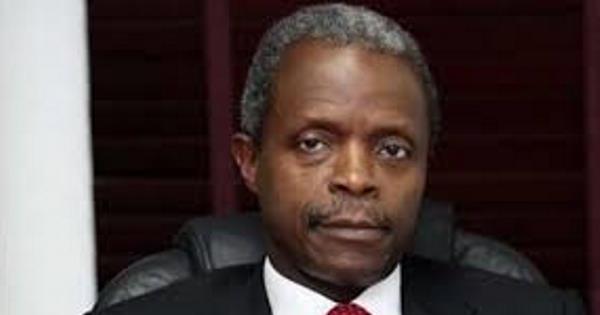E-Financial
Osinbajo Tasks Banks on Transformation Projects

Vice President Yemi Osinbajo yesterday tasked the banking and finance sector to take on more transformative projects such as housing and renewable energy, among others, in ways that will significantly impact job creation and poverty reduction.

Prof Osinbajo stated this at the opening session of the 14th Annual Banking and Finance Conference themed “Economic Recovery, Inclusion, and Transformation, the role of Banking and Finance”,
He noted that the banking and finance sector has over the years played significant roles in the economy.
President Muhammadu Buhari had earlier declared the conference opened and his Rwandan counterpart, Paul Kagame also delivered the keynote address.
According to the Vice President, “it is time for the sector to take on some of the transformative big-ticket items that would fundamentally transform our economy. Such matters include consumer finance but housing finance in particular.”
He noted that a focus on how to finance housing is critical.
Referencing an African Development Bank (AfDB) survey, Prof. Osinbajo said “the housing sector may support poverty reduction and inclusive growth in two general ways. First, housing construction contributes to economic output, creates employment, and generates a demand for materials and related services. Second, improved housing raises the standard of living of occupants.
“That study (AfDB survey) says for example that the benefits of housing for individuals accrue in large part through better health and sanitation, and of course this improves the overall human capacity of our citizens who are able to own these houses. Housing also generates large multiplier effects in terms of employment and output. Employment is created for both skilled and poorer, unskilled workers.
“The evidence also suggests that there is a symbiotic relationship between housing finance and financial sector development. Housing finance helps to develop the financial sector itself and helps to contribute to economic growth. So, these were the justifications that we also advanced for our mass housing initiative in the Economic Sustainability Plan.”
Challenging the banking sector on participating in the Federal Government’s Mass Housing programme, the VP noted that “the finance sector appears shy or simply has not found the right housing finance model that will work.”
On renewable energy and mitigating the impact of climate change, Prof. Osinbajo said “one of the chief considerations especially for developing countries is how to pay for the massive transition to renewable energy. How do we pay for moving from where we are especially fossil fuel-based power sources to renewable energy? This is a significant challenge but it is also an enormous opportunity.”
Citing the example of the Federal Government’s solar power initiative, Prof. Osinbajo decried the low interest shown by Commercial Banks to catalyze installations or manufacturing for the Solar Power Naija programme.
He explained that “the challenge of under-electrification of the rural and poor and its associated impacts on our economic well-being and security cannot be overstated. The climate change challenge is a massive one in more ways than we can imagine.
“I would like to encourage the Bankers Committee to refocus on supporting the Solar Power Naija to ensure that in the next few months we can catalyze access to the N140 billion and create 5 million connections that can multiply to eliminating our electricity access deficit and creating jobs.”
While commending the sector for its efforts in improving service delivery over the years, the VP noted that “going forward, the banking and finance sector must take advantage of the new opportunities that are opening up and also adapt to domestic and international developments.
“The rapid changes in the technology sector mean that financial technology companies and payment service companies are now an inescapable part of the banking and financial landscape.”
Prof Osinbajo also suggested that financial inclusion being critical to the objectives of recovery, inclusion and transformation, should be prioritized “especially in this COVID era, for the poor and more vulnerable sections of society so that they can keep their micro-businesses alive and handle risks and uncertainty.”
Other dignitaries who spoke at the event include Governor Babajide Sanwo-Olu of Lagos State; Governor of the Central Bank of Nigeria, Godwin Emefiele, and President of the Chartered Institute of Bankers (CIBN), Mr Bayo Olugbemi, among other bank executives across the country with several participants also joining virtually.
E-Financial
NDIC Begins Final Settlements to Creditors of Liquidated Premier Bank

Nigeria Deposit Insurance Corporation (NDIC) has begun the final phase of liquidation for the defunct Premier Commercial Bank, initiating the payment of liquidation dividends to verified creditors, nearly 25 years after the bank’s closure.

Premier Commercial Bank had its operating license revoked by the Central Bank of Nigeria (CBN) on December 20, 2000, following findings of financial instability and regulatory non-compliance.
Since then, the NDIC has overseen the bank’s liquidation process under a winding-up order from the Federal High Court, which designated the corporation as the official liquidator.
In a public announcement, the NDIC invited all eligible creditors to visit any of its zonal offices between June 2 and June 27, 2025, to verify and claim their entitlements.
This move marks a critical milestone in the final settlement of claims related to the bank’s collapse.
To facilitate the verification process, creditors are required to present proof of deposit or shareholding, such as a passbook, chequebook, term deposit certificate, or bank statement.
Additionally, valid identification documents must be submitted, including a driver’s license, international passport, national identity card, NIN slip/card, voter’s card, or a formal identification letter from a traditional ruler or local government chairman.
The NDIC assured the public that the ongoing settlement is part of a broader effort to bring closure to longstanding claims resulting from Premier Commercial Bank’s liquidation. The process, according to the corporation, has been designed to ensure efficient disbursement to all verified stakeholders.
Premier Commercial Bank is one of 53 deposit money banks whose licenses were revoked by the CBN between 1994 and 2018 due to various violations and signs of financial distress.
These closures were followed by legal procedures appointing the NDIC to manage asset recoveries and creditor settlements.
By initiating this final phase of payment, the NDIC is reaffirming its commitment to financial system stability and depositor protection while calling on all affected individuals and institutions to complete verification processes promptly to receive their due compensation.
E-Financial
SEC Directs Companies to Honour Unclaimed Dividend Requests

Securities and Exchange Commission (SEC) has directed all public companies and Registrars to stop treating unclaimed dividends older than 12 years as “statute-barred”, especially those dating from before the enactment of the Finance Act 2020.

The directive reaffirms the provisions of Section 60 of the Finance Act, which mandates that dividends unclaimed for over six years be transferred to the Unclaimed Funds Trust Fund (UFTF), where they remain accessible to shareholders pending claims.
The Commission said that shareholders are entitled to continue to claim their dividends that are not statute-barred (that is not above 12 years) before December 31, 2020 “when the Finance Act 2020, came into effect.”
According to the SEC in a Circular, “The attention of the Securities and Exchange Commission has been drawn to the fact that paying companies and their Registrars have continued to treat unclaimed dividends of public companies that are older than 12 years as being “statute-barred” without recourse to the provisions of the Finance Act 2020.
“In response to various inquiries on the subject, the Commission hereby clarifies as follows: The import of the provisions of Section 60 of the Finance Act 2020 (December 31, 2020), is that, where dividends declared by a public company quoted on the Nigerian Exchange Limited remained unclaimed for a period of six years or more, such dividends are expected to be transferred to the Unclaimed Funds Trust Fund (UFTF) to be held in trust and managed pending when the shareholder presents a claim for such unclaimed dividends.
“Pending the setting up and operationalisation of the UFTF by the Federal Government, pursuant to its powers under Sections 3 (4) (e) and 93 of the Investments and Securities Act 2025, the Commission hereby directs public companies and their Registrars to continue to honour all requests by shareholders for the payment of unclaimed dividends as described above, with effect from December 31, 2020”.
The Commission therefore directed public companies and Registrars to effect immediate compliance with the directive and submit periodic reports on same in the manner prescribed in the Commission’s Rules and Regulations.
E-Financial
FIRS Launches Revised SOP to Streamline Tax Payment

Federal Inland Revenue Service (FIRS) has revised its Standard Operating Procedure (SOP) as part of efforts to improve consistency, transparency, and service delivery in tax administration across the country.

According to a statement on Monday in Abuja by Mr. Collins Omokaro, Special Adviser on Communication Strategy and Advocacy to the Executive Chairman of FIRS, the revised SOP offers a unified framework for core tax processes including registration, payment, audit, and enforcement.
“This is about people, experience, and impact. It’s a step toward a tax system that supports voluntary compliance and national development,” Omokaro said.
He explained that while FIRS field offices have long operated with good intentions, inconsistent methods across different locations often created confusion for taxpayers.
The revised SOP, he said, is designed to eliminate such disparities by providing a single, clear roadmap for operations in all of the Service’s over 300 offices nationwide.
More than just a procedural manual, the new SOP is described as a statement of institutional direction, reflecting values that define the future of the Service.
Omokaro quoted Dr. Zacch Adedeji, executive chairman of FIRS, as saying that “This SOP is not just a technical document—it is a declaration of who we are becoming as a service. It reflects our commitment to transparency and service to the Nigerian people.”
The SOP update is one component of a broader reform agenda underway at FIRS, which aims to transform the agency into a fully service-oriented institution.
The changes are also aligned with the ongoing digital transformation within the agency, which is intended to harmonize human and technological systems for faster, more reliable, and taxpayer-friendly service delivery.
Internally, the SOP is expected to enhance operational efficiency and provide a foundation for improved staff training, clearer guidance, and stronger evaluation systems. Omokaro noted that every FIRS employee is expected to study, implement, and embody the procedures outlined in the new document.
“With this rollout, every FIRS staff member has a clear mandate: study it, apply it, and embody it. That’s how we’ll earn the trust of Nigerians,” he said.
The SOP reform is being introduced as part of the Service’s broader mission to reposition itself as a modern tax authority grounded in accountability, consistency, and a shared sense of national purpose.
The move comes as the FIRS continues to modernize its processes, improve tax collection efficiency, and foster a culture of voluntary compliance—all aimed at strengthening revenue mobilization to support Nigeria’s development agenda.

 News2 days ago
News2 days agoCDCFIB Warns against Recruitment Racketeers

 Broadcasting2 days ago
Broadcasting2 days agoAfia TV and Radio Stamps Footprints in Lagos

 News2 days ago
News2 days agoFG May Forfeits $4m from World Bank Loan over Audit Flop

 Telecom2 days ago
Telecom2 days agoMeta, FMCIDE Unveil AI Accelerator to Drive Innovation in Nigeria

 Telecom2 days ago
Telecom2 days agoNigeria Leads the Charge in Green Innovation @MTN’s Africa PachiPanda Challenge

 Telecom2 days ago
Telecom2 days agoZinox Technologies Collaborates with FGN for VivaTech Paris 2025

 News2 days ago
News2 days agoConcerned Nigerians Ask EFCC to Release Abiodun, CBEX Promoter

 E-Business1 day ago
E-Business1 day agoAfrican Startups Raised $345m in Funding in May

























